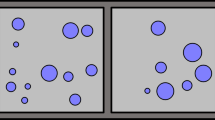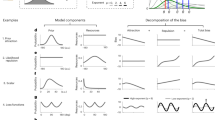Abstract
GREGORY has proposed1 and defended2 an account of the geometric illusions based on the notion of ‘misplaced constancy scaling’. Following Tausch, he suggests that all illusion figures have features indicating depth by perspective which bring into play size constancy scaling, leading to expansion of some parts of the figure relative to others. For this theory he makes the claim that “so far no valid objections seem to have been raised”2. The theory nevertheless needs challenging.
This is a preview of subscription content, access via your institution
Access options
Subscribe to this journal
Receive 51 print issues and online access
$199.00 per year
only $3.90 per issue
Buy this article
- Purchase on Springer Link
- Instant access to full article PDF
Prices may be subject to local taxes which are calculated during checkout
Similar content being viewed by others
References
Gregory, R. L., Nature, 199, 678 (1963).
Gregory, R. L., Nature, 204, 302 (1964).
Gregory, R. L., “Stability and Distortions of Visual Space,” Intern. Cong. Human Factors in Electronics, May 1962, Long Beach, California (1962) (unpublished).
Author information
Authors and Affiliations
Rights and permissions
About this article
Cite this article
HUMPHREY, N., MORGAN, M. Constancy and the Geometric Illusions. Nature 206, 744–745 (1965). https://doi.org/10.1038/206744b0
Published:
Issue Date:
DOI: https://doi.org/10.1038/206744b0
Comments
By submitting a comment you agree to abide by our Terms and Community Guidelines. If you find something abusive or that does not comply with our terms or guidelines please flag it as inappropriate.



